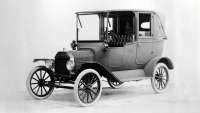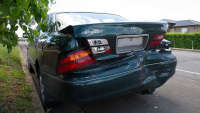What is the definition of a luxury car? It may seem like an obvious question to answer, but like so many things in life, once you start to really examine it and scratch beneath the surface, defining a luxury car isn’t quite as simple as it first appears.
In this article we’re going to take a deep dive into what makes a car a ‘luxury car’ and examine the diverse array of cars that catch-all term encompasses.
The Australian Tax Office defines a luxury car like this: “A car, for luxury car tax purposes, is a motor-powered road vehicle designed to carry a load of less than two tonnes and fewer than nine passengers.”
For the 2022-23 financial year, the ATO imposes its luxury car tax (LCT) on any vehicle meeting that definition costing more than $71,849 - or $84,916 for fuel-efficient vehicles.
By that definition a Toyota LandCruiser Troop Carrier Workmate, which is priced from $74,950, is considered a luxury vehicle. But for most people, it’s most definitely not what can reasonably be considered a high-end car.
In more simple terms, a luxury car is a motor vehicle that has above-average levels of quality and equipment. Some of the more obvious top luxury car brands include Rolls-Royce and Bentley but it also includes higher-volume marques such as Mercedes-Benz, BMW and Cadillac.
But while some manufactures only make luxury cars, there are an increasing number of what can be considered mainstream brands are making more premium cars.
The line between premium car brands and so-called ‘semi-premium’ carmakers, such as Mazda and Volkswagen is blurring as the quality, safety and driving dynamics improve across a wider array of vehicle types and prices, expanding beyond what have traditionally just been seen as simply expensive car brands.
The world is also changing with the rise of electric vehicles, which has opened the door for both existing car makers to reinvent themselves (e.g. Volvo and Jaguar) as more luxurious or new brands (the likes of Tesla and Polestar) to establish themselves alongside the best luxury cars.
Of course, a luxury vehicle doesn’t just have to be slow and loaded with leather and wood, performance brands like Porsche, Ferrari, Lamborghini and the like can also be seen as luxury car brands in this modern age.
Below you’ll find a list of the top luxury car brands in the world, as determined by a variety of factors including heritage, quality of the cars, market position and market relevance. There are far more than 10 successful luxury carmakers so we’ve prioritised those that are enjoying success in the Australian market.
.jpg)
10. Lexus
Established: 1989
Country of origin: Japan
2022 Australian sales: 7809
Created amidst the Japanese car industry boom of the 1980s, Lexus has established itself as one of Australia’s most respected luxury brands. While it has never been able to topple the likes of Mercedes-Benz and BMW on the sales charts, it has offered a reliable and good value alternative to the Germans.
After a difficult 2022 (like so many brands) that saw a sales dip, Lexus looks set to rebound strongly in 2023. The arrival of the new-generation RX SUV and the all-new RZ electric SUV will give the brand a boost in image and sales.
.jpg)
9. Land Rover
Established: 1948
Country of origin: United Kingdom
2022 Australian sales: 4348
While it began life making an off-road utility vehicle in post-World War II Britain, by 1951 the company had earned a Royal Warrant from King George VI and by 1970 had established the Range Rover sub-brand.
These days Land Rover is a luxury brand in its own right, even if the likes of the Defender and Discovery remain capable off-roaders, but Range Rover is set to become a brand in its own right and take on more prominence in the future of the Tata-owned Jaguar Land Rover operation.
Range Rover already offers the flagship namesake model plus the Sport, Velar and Evoque, and by the end of 2023 the first all-electric model will be added to the mix.
.jpg)
8. Audi
Established: 1909
Country of origin: Germany
2022 Australian sales: 14,732
Do you know why Audi has its famous four-rings logo?
The origins of Audi can be traced back to 1909, and include some interesting trivia if you’re a fan of that sort of thing.
Company founder August Horch had already been involved in the car industry since 1885 and after establishing a company using his name in 1902, when he set up August Horch Automobilwerke GmbH in 1909 his former business partner sued him. So, he used the Latin translation of his name, Audi.
But that’s not the end of the story. In the early 1930s Audi merged with Horch, DKW and Wanderer to form Auto Union - adopting a logo of four interlocking rings to signify the four companies and celebrate the upcoming Berlin Olympic Games.
After WW2 and the dissolution of Auto Union, Audi re-emerged as a brand in its own right in 1969 but kept the four-ring logo. Since then it has gone on to become one of the world’s leading luxury brands, alongside Mercedes-Benz and BMW.
It has produced some of the most iconic luxury and performance cars in the world, including the ur-Quattro, A4 and RS6 Avant. These days its most popular models include its plethora of SUVs, including the Q3, Q5 and Q7 plus its all-electric e-tron.
And another trivia tidbit - Audi claims to have popularised left-hand drive. Introducing the Audi Type K in 1921, which ditched the previous right-hand drive layout used by German carmakers because it allowed for better line-of-sight driving on the right-hand side of the road as Germany did.
.jpg)
7. Porsche
Established: 1931
Country of origin: Germany
2022 Australian sales: 5608
Ferdinand Porsche established his company in 1931 and initially did design work for other companies, most famously developing the Volkswagen Beetle. Which is why the first model to wear the Porsche badge, the 356, used a number of Volkswagen parts.
Over time, though, Porsche has evolved into one of the world’s most desirable luxury brands. It built its reputation on the road and racetrack, with vehicles like the 550 Spyder and, of course, the 911.
While it remains a sports car brand at heart, with the 718 Boxtser and Cayman sitting alongside the 911, Porsche has expanded its range to include more practical and popular models including the Cayenne and Macan SUVs as the Panamera and Taycan sedans.
This has allowed Porsche to grow and become one of the most successful luxury brands in the Australian market, selling more than 5500 vehicles last year.
_0.jpg)
6. Tesla
Established: 2003
Country of origin: USA
2022 Australian sales: 19,594
The youngest entry on our list proves that not all luxury brands need to be old. Or build cars with internal combustion engines. Or, indeed, really be a car company at all.
Tesla Inc. (formerly Tesla Motors) began in 2003 with partners Martin Eberhard and Marc Tarpenning wanting to build an electric car but also focus on the software side of the business.
Elon Musk came on-board to the project in 2004 and before long the South African-born businessman and Tesla would become forever linked.
After the launch of the Lotus Elise-based Roadster in ‘06 the company built its first bespoke vehicle, the Model S sedan, in 2012. Since then it has expanded with the Model X and Model Y SUVs and the Model 3 compact sedan.
While not a traditional luxury brand, Tesla has carved out its own space in the market, blending performance and technology to create a highly-desirable brand (at least based on sales).
Love or hate Musk and his cars, there can be no doubt Tesla has been a major catalyst for the car industry's electric revolution and the brand is now a genuine rival to the likes of Mercedes-Benz, BMW and Audi.
_0.jpg)
5. Bentley
Established: 1919
Country of origin: United Kingdom
2022 Australian sales: 203
When you think of a luxury car, the chances are you’ll probably picture something like a Bentley in your mind’s eye. The British brand is the quintessential luxury carmaker, with a rich heritage, reputation for quality and focus on quality over quantity to ensure demand of its vehicles remains higher than the supply.
Bentley was established in 1919 but really made a name for itself at the famous 24-hours of Le Mans race in the late 1920s.
At a time when motor racing was seen as a proving ground for brands in terms of performance and reliability, racing for 24-hours at Le Mans was the ultimate test of the machine.
So, when Bentley won in 1924, ‘27, ‘28, ‘29 and ‘30 it showed the world this was a company that made true luxury motor vehicles.
While over time it has had its ups and downs, since 1998 Bentley has been part of the Volkswagen Group and is now firmly established as one of the most esteemed luxury brands.
The Continental GT speaks to its racing past, the Flying Spur is its traditional luxury sedan offering and the Bentayga SUV is its evolutionary model to meet the modern luxury buyer’s demands.
.jpg)
4. BMW
Established: 1916
Country of origin: Germany
2022 Australian sales: 22,696
It may have started building aero engines, but these days BMW is one of the biggest luxury brands in the world. In 2022 it sold 2,399,636 cars around the world, which means it was the best-selling premium carmaker, beating Mercedes’ 2,043,900 sales.
The two companies have long been established as the two most successful luxury car companies in terms of volume. While not quite as prestigious as Bentley and Rolls-Royce, BMW and Mercedes-Benz walk the line between volume and stature.
BMW is a brand with widespread appeal, offering accessible luxury models like the 1 Series and X1, all the way up to high-performance M cars (such as the M4 and M8) and flagship models like the 7 Series and X7.
To ensure it remains one of the most popular luxury brands it’s rapidly expanding its EV range, too, with the likes of the iX3, i4 and XM.
.jpg)
3. Ferrari
Established: 1939
Country of origin: Italy
2022 Australian sales: 203
It’s one of the most iconic luxury brands in the world, not just in the automotive space but across the entire luxury spectrum. But Enzo Ferrari didn’t really want to make road cars.
Ferrari began his career wanting to be a racing car driver and running racing operations for Alfa Romeo under the Scuderia Ferrari (which means ‘Ferrari Stable’) in the 1930s.
In 1947 Ferrari was racing a car with his name on it, the 125 S, but needing to fund his racing desires he began to sell road-going cars.
Fast forward to now and Ferrari (the company) is a powerhouse, listed on the New York Stock Exchange and - at the time of publication - a market value of more than $50 billion.
The key to Ferrari’s success is and has always been rarity. A key tenet of a luxury brand is exclusivity, so Ferrari has always stated its goal is to build one less car the demand requires - thus maintaining a healthy waiting list of its cars.
It has also focused primarily on sports cars and supercars, with the current range consisting of the 296 GTB, SF90 Stradale and the incoming Purosangue ‘SUV’ (although the company prefers you think of it as a high-riding, four-door sports car).
.jpg)
2. Mercedes-Benz
Established: 1926
Country of origin: Germany
2022 Australian sales: 26,801
While BMW may have managed to out-sell it globally, in Australia Mercedes-Benz remains the most popular luxury car brand. But it also takes a higher spot on our list because, put simply - Mercedes-Benz is the company that invented the automobile.
While Mercedes-Benz as a company was technically founded in 1926, it was Gottlieb Daimler and Karl Benz who created the first car in 1886 and helped establish both the concept of the motor car and the brand as we know it today.
Like its Bavarian rival, the Stuttgart-based brand manages to maintain its premium appeal while also selling such a large volume of cars. The three-pointed star logo is a symbol of status on roads all around the world.
The company also has its own more luxurious sub-brand, Mercedes-Maybach, that was once a stand-alone operation but is now attached to existing Mercedes-Benz models but turn up the levels of opulence.
.jpg)
1. Rolls-Royce
Established: 1906*
Country of origin: United Kingdom
2022 Australian sales: 60
The benchmark by which all others are measured - that’s Rolls-Royce.
Classically designed and imposing large vehicles, powered by big-capacity engines to haul along the cars filled with the finest leathers, woods and metals inside, Rolls-Royce have and remain luxury on wheels.
Built in highly limited numbers with pain-staking attention to detail, Rolls-Royce really does define what a luxury car can be. These are the cars driven by the world’s richest people so they can show off their wealth on the road.
In 2022 Rolls-Royce sold just 6021 vehicles around the world, which for context is less than RAM sold in Australia last year, so exclusivity is certainly a key aspect of the brand’s appeal.
You’ll notice an asterisk on the established year, and that’s because Rolls-Royce Motor Cars as we know it today only began operating officially in 1998.
That was when BMW Group took control of the operation after a complex three-way deal with Vickers (the engineering firm that controlled Roll-Royce aero engine business) and Volkswagen Group.
But even if it isn’t technically the same legal entity that began in 1906, every modern Rolls feels like it has a connection to the brand’s illustrious past.
Rolls-Royce is set to launch its first all-electric model, the Spectre, by the end of 2023, which will power it into the future to retain its place at the pinnacle of the luxury car market.



.jpg)
.jpg)
.jpg)


.jpg)

.jpg)
 copy.jpg)
.jpg)


.jpg)
.jpg)
.jpg)
.jpg)
.jpg)
.jpg)

.jpg)
.jpg)
_0.jpg)

.jpg)


.jpg)

.jpg)
Comments